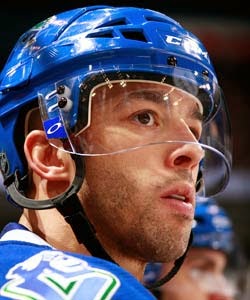 If you think 7th and 8th seeded wildcard teams teams don't have a fighting chance against the 1st and 2nd seeded division winners in the opening round of the Stanley Cup playoffs, you'd be wrong. The mighty NHL underdog is no stranger to serving up early round upsets.
If you think 7th and 8th seeded wildcard teams teams don't have a fighting chance against the 1st and 2nd seeded division winners in the opening round of the Stanley Cup playoffs, you'd be wrong. The mighty NHL underdog is no stranger to serving up early round upsets.
Since the introduction of the conference playoff format in 1994, opening round upsets have been ubiquitous with 30 of the 84 such 1st vs. 8th and 2nd vs. 7th series being won by lower seeds. That's a better than 1 in 3 chance (36%) of underdog success at the expense of division winners.
Despite abandoning the conference playoff format in favor of a divisional playoff format for the 2014 postseason, top finishers remain paired with the weakest qualifiers in the opening round, with the top division winner in each conference playing the weakest wildcard (i.e., 1st vs. 8th) and the other division winner playing the remaining wildcard (i.e., 2nd vs. 7th).
The chart below shows series records by year for 1st vs. 8th and 2nd vs. 7th opening round matchups, with annual and cumulative totals.
| Year | 1st vs. 8th | 2nd vs. 7th | Total |
| 1994 |
1-1
|
0-2
|
1-3
|
| 1995 |
1-1
|
1-1
|
2-2
|
| 1996 |
2-0
|
2-0
|
4-0
|
| 1997 |
2-0
|
1-1
|
3-1
|
| 1998 |
1-1
|
0-2
|
1-3
|
| 1999 |
1-1
|
1-1
|
2-2
|
| 2000 |
1-1
|
1-1
|
2-2
|
| 2001 |
2-0
|
0-2
|
2-2
|
| 2002 |
1-1
|
1-1
|
2-2
|
| 2003 |
2-0
|
1-1
|
3-1
|
| 2004 |
2-0
|
1-1
|
3-1
|
| 2006 |
1-1
|
1-1
|
2-2
|
| 2007 |
2-0
|
2-0
|
4-0
|
| 2008 |
2-0
|
2-0
|
4-0
|
| 2009 |
1-1
|
2-0
|
3-1
|
| 2010 |
1-1
|
1-1
|
2-2
|
| 2011 |
2-0
|
2-0
|
4-0
|
| 2012 |
1-1
|
1-1
|
2-2
|
| 2013 |
2-0
|
0-2
|
2-2
|
| 2014 |
2-0
|
1-1
|
3-1
|
| 2015 |
2-0
|
1-1
|
3-1
|
| Total |
32-10
|
22-20
|
54-30
|
In 11 of the past 21 postseasons both top seeded teams prevailed, including 4 in the past 5 years. The remaining 10 series saw a split. Never have both top seeded teams been eliminated in the opening round. Put another way, top finishers have a 32-10 record during this span, representing a 76% success rate over their 8th seeded foes.
Presidents' Trophy winners have survived the first round 16 of 21 times (76%) falling only five times during this period (St. Louis 2000, Detroit 2006, San Jose 2009, Washington 2010, Vancouver 2012).
Of the 2nd seeded teams, 5 of 21 times (1996, 2007, 2008, 2009, 2011) both won their opening round and 4 of 21 times (1994, 1998, 2001, 2013) each were eliminated. The remaining 12 of 21 postseasons saw a split with a 2nd seeded team advancing in one series and the 7th seed prevailing in the other. In sum, 2nd seeded teams have a 22-20 record during this period, representing a mere 52% margin of success.
In only 4 of the past 21 playoffs (1996, 2007, 2008, 2011) have all four 1st and 2nd seeded teams advanced past the opening round, representing a lowly 19% chance of collective success. That said, never before have all four favorites been eliminated in the first round.
More than ever, regular season point differentials between playoff qualifiers is narrowing, blurring the lines between favorites and underdogs. During the 82 game seasons from 1994 until the 2004 Lockout, 7 of 10 had at least a 30 point gap, compared to only 2 of the past 9 such seasons since. The largest spread during this span is 53 points (1996) and the smallest 16 points (2015), with a 21 season average of a 28 point differential. The last time there was a spread of less than 16 points was in 1965 when just four teams qualified for the postseason.
In short, the conference's best usually survive but others are exposed. But that could be changing in the NHL's modern age of postseason parity. Stay tuned.
* See also NHL Playoff Comebacks Trailing 3-0.
* See also NHL Playoff Comebacks Trailing 3-1.
* See also NHL Stanley Cup Playoff Game 7 History.
* See also NHL Playoff Seeding and Stanley Cup Wins.
* See also Presidents' Winners & Defending Cup Champions.



